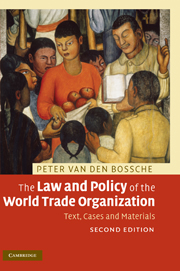Book contents
- Frontmatter
- Contents
- List of figures
- Preface to the first edition
- Preface to the second edition
- Table of cases
- Table of agreements
- 1 ECONOMIC GLOBALISATION AND THE LAW OF THE WTO
- 2 THE WORLD TRADE ORGANIZATION
- 3 WTO DISPUTE SETTLEMENT
- 4 PRINCIPLES OF NON-DISCRIMINATION
- 5 RULES ON MARKET ACCESS
- 6 RULES ON UNFAIR TRADE
- 7 TRADE LIBERALISATION VERSUS OTHER SOCIETAL VALUES AND INTERESTS
- 8 TOWARDS HARMONISATION OF NATIONAL REGULATION
- Epilogue
- Index
7 - TRADE LIBERALISATION VERSUS OTHER SOCIETAL VALUES AND INTERESTS
Published online by Cambridge University Press: 05 June 2012
- Frontmatter
- Contents
- List of figures
- Preface to the first edition
- Preface to the second edition
- Table of cases
- Table of agreements
- 1 ECONOMIC GLOBALISATION AND THE LAW OF THE WTO
- 2 THE WORLD TRADE ORGANIZATION
- 3 WTO DISPUTE SETTLEMENT
- 4 PRINCIPLES OF NON-DISCRIMINATION
- 5 RULES ON MARKET ACCESS
- 6 RULES ON UNFAIR TRADE
- 7 TRADE LIBERALISATION VERSUS OTHER SOCIETAL VALUES AND INTERESTS
- 8 TOWARDS HARMONISATION OF NATIONAL REGULATION
- Epilogue
- Index
Summary
INTRODUCTION
The promotion and protection of public health, consumer safety, the environment, employment, economic development and national security are core tasks of governments. Often, trade liberalisation and the resulting availability of better and cheaper products and services facilitate the promotion and protection of these and other societal values and interests. Through trade, environmentally friendly products or life-saving medicines, that would not be available otherwise, become available to consumers and patients respectively. At a more general level, trade generates the degree of economic activity and economic welfare indispensable for the effective promotion and protection of the societal values and interests referred to above.
In order to protect and promote these societal values and interests, however, governments also frequently adopt legislation or take measures that inadvertently or deliberately constitute barriers to trade. Members are often politically and/or economically ‘compelled’ to adopt legislation or measures which are inconsistent with rules of WTO law and, in particular, with the principles of non-discrimination and the rules on market access discussed in chapters 4 and 5. Trade liberalisation, and its principles of non-discrimination and rules on market access, often conflicts with other important societal values and interests. Therefore, WTO law provides for a set of rules to reconcile trade liberalisation with other societal values and interests. As the Sutherland Report noted:
Neither the WTO nor the GATT was ever an unrestrained free trade charter. In fact, both were and are intended to provide a structured and functionally effective way to harness the value of open trade to principle and fairness. […]
- Type
- Chapter
- Information
- The Law and Policy of the World Trade OrganizationText, Cases and Materials, pp. 614 - 739Publisher: Cambridge University PressPrint publication year: 2008



